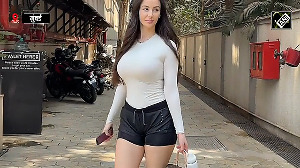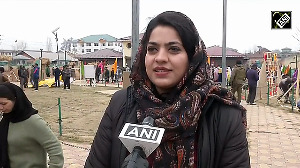Does the financial capital of India need a monument twice the size of Qutb Minar with a revolving restaurant on the top floor? Or does it need 3 lakh more hawker licenses and slum development? Does it need McKinsey to draw its development plan or does it need a dialogue between the haves and the have nots? Are slums that recycle the city's wastes better than unhealthy slum rehabilitation concrete cubicles? Is Vision 2020 the panacea for Mumbai's ills?
'Think city: The possibilities and realities of change in Mumbai' a seminar at the National Centre for Performing Arts on Saturday threw up many such questions.
Slide Show: Salaam Mumbai!
"I am a hawker," said Sandeep Yeole of the Maharashtra Hawkers Forum, delivering a PowerPoint presentation on why the Vision 2020 plan for Mumbai was 'To the capitalist, by the capitalist, for the capitalist.'
He refuted "the myth" of hawkers being freeloaders. "BMC [Brihanmumbai Municipal Corporation] collects Rs 12 crore through license fees, while Rs 1,500 crore goes as hafta to police and civic authorities." These are figures from a Supreme Court petition, he said.
Yeole pointed out that there are 3.2 lakh hawkers in the city, while the Supreme Court has allowed just about 17,000 licenses.
Pointing that a city cannot wish away its people, he asked why the authorities in Mumbai do not allow hawkers to operate under the development control rules. Imphal in faraway Manipur does, he pointed out.
Sanjay Ubale, in charge of the Task Force for Vision 2020, outlined a new Mumbai cleaner, more beautiful, with more flyovers and radio-connected taxis. "I must feel I have a chauffeur-driven car in the city anytime I want," he said.
He denied Vision 2020 was an elitist plan for Mumbai. "Poverty alleviation would drive the services. The poor subsidise the rich in this city. The issue is not so much about housing. When slum dwellers are given homes they can't afford it [living there]."
Turning informal markets into formal markets is the key to growth, he said. In plain speak, that is turning the black market white. "When you go to a movie hall, you see the main window saying 'houseful' while tickets are being sold in black." The trick is to ensure "the main window" remains open, he said. There is a need to "enforce the rule of the law," he said.
Ubale said a Mumbai Development Fund will be set up to overhaul infrastructure and health facilities, create more jobs and improve housing and governance. As long as citizens feel the money is being spent rightly they will contribute, he said.
Kumar Ketkar, editor of Marathi daily Loksatta, called it the "schizophrenia of Mumbai." What is the point of spending crores on the beautification of Marine Drive when 70 per cent of Mumbai lives in the suburbs, he asked. "Those who have are discussing how to have it better," he said.
Mumbai, as it exists today, he said, was never planned. Bombay was a reclaimed creek where agricultural land had been turned to industrial use and now it was being de-industrialised for housing, he said.
Mumbai has about 12 lakh cars but 60 to 70 lakh people travel in local trains everyday, Ketkar pointed out. "Nobody talks about them
"
The thinly attended seminar had many more such thickly debated issues, from the proposed Bandra-Worli sea link to the definition and benefits of globalisation.






 © 2025
© 2025